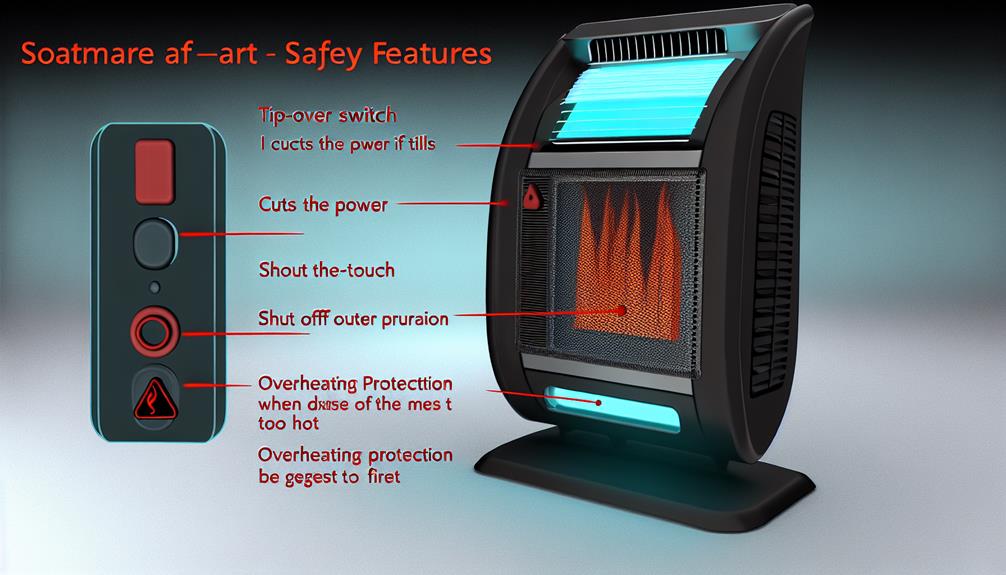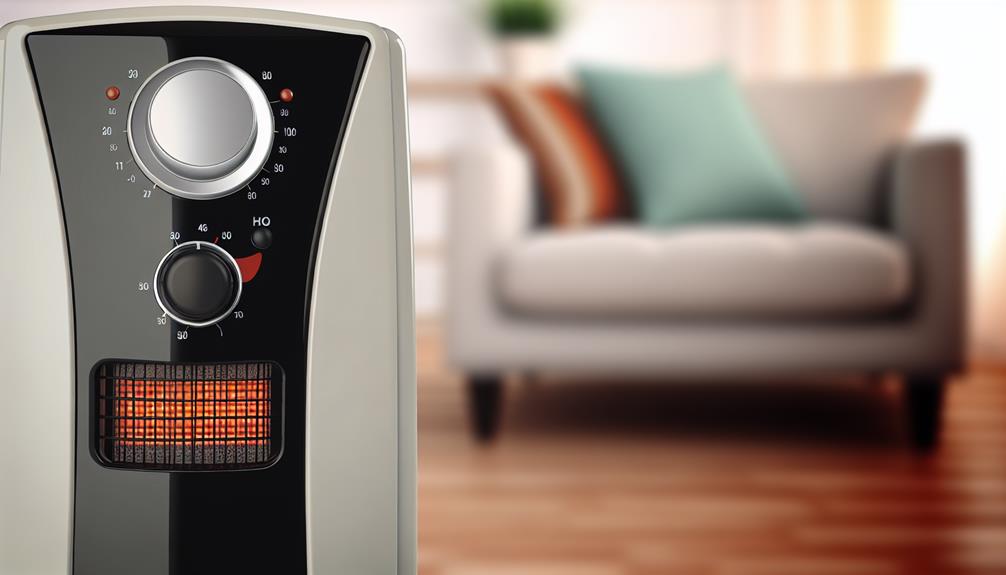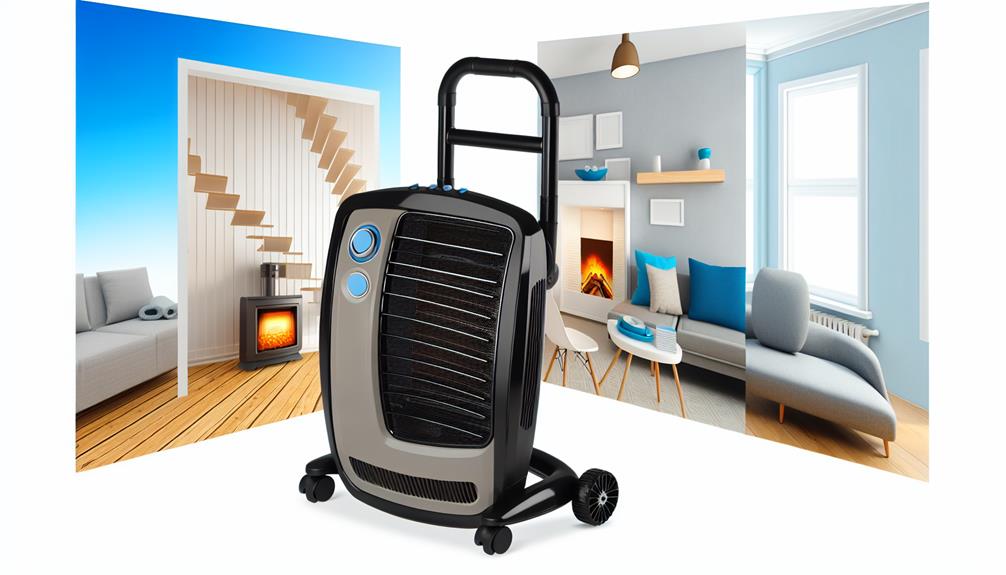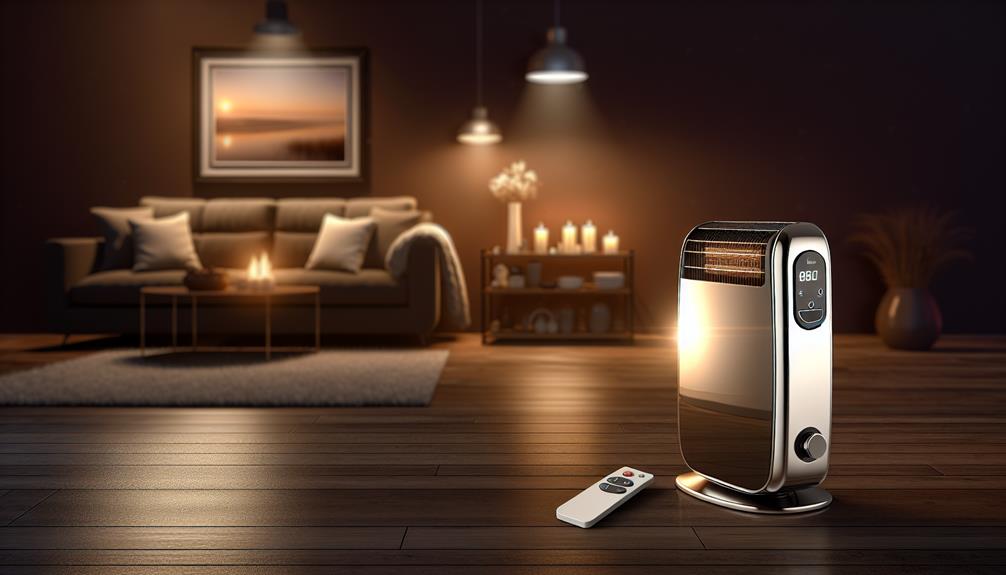Isn't it crucial to stay warm without the worry of skyrocketing energy bills or safety hazards? As you're considering investing in a new portable heater, there are several key features you should keep in mind. Energy efficiency ratings will affect your long-term costs, so you'll want to find a unit that keeps your space comfortable without draining your wallet. Safety mechanisms are non-negotiable; look for heaters with automatic shut-off features and overheat protection to ensure your peace of mind. But beyond the essentials, you're likely searching for that perfect balance of convenience and effectiveness. From adjustable thermostat controls to the practicality of portability and size, the right heater can blend seamlessly into your life. And while you're weighing your options, don't overlook the importance of a low noise level—after all, your comfort isn't just about temperature. Stay tuned to uncover the nuances behind each of these considerations, which will guide you to a decision that promises warmth through the chilliest months, without any unwelcome surprises.
Key Takeaways
- Consider the type of heater you need, such as convection or radiant, based on the type of heating you prefer (whole-room or targeted warmth).
- Look for energy-efficient models with thermostats and multiple heat settings to regulate temperature and conserve energy.
- Prioritize safety features like automatic shut-off and tip-over protection to prevent accidents and fires.
- Opt for heaters with adjustable thermostat controls for precise regulation of the room's temperature and improved energy efficiency.
Heater Type Selection
When selecting a portable heater, it's crucial to choose a heating method that aligns with your specific needs, whether that be convection for even room heating or radiant for direct, spot warmth. Your heater type selection can greatly affect your comfort and the efficiency of your device. Convection heaters work by warming the air in a room, making them ideal for consistent, whole-room heating. On the other hand, radiant heaters emit infrared rays that directly heat objects and people in their path, providing quick, targeted warmth.
As you delve into the types of space heaters, you'll find portable electric heaters are widely popular due to their convenience and ease of use. However, it's essential to evaluate the energy efficiency of different types of heaters to ensure you're not unnecessarily inflating your energy bills. Look for models with thermostats and multiple heat settings, as these can help regulate temperature and conserve energy.
Keep in mind that safety should never be compromised. Opt for heaters with automatic shut-off and tip-over protection features. Moreover, steer clear of using extension cords, as they can pose a fire hazard when used with space heaters. Your informed choice will reflect a balance between personal comfort, energy efficiency, and safety.
Energy Efficiency Ratings
Understanding a portable heater's energy efficiency rating is essential as it directly impacts your utility expenses and environmental footprint. When you're in the market for a new heater, keeping an eye on energy efficiency ratings can help you save energy and money in the long run.
- Energy Efficiency Ratings:
- Indicate how well heaters use energy to produce heat
- High ratings often equate to lower heating bill costs
- *Energy Star Certification:*
- Identifies heaters that meet strict guidelines
- Ensures you're choosing a product that's designed to save energy
- *Wattage and Heat Output:*
- Look for lower wattage with higher heat output
- This combination means more heat for less energy, optimizing the use of space heaters
Not only do energy efficient heaters help in reducing your energy consumption, but they also contribute to a smaller environmental footprint. Be mindful that efficient heating doesn't just depend on energy efficiency ratings. Features like overheat protection not only provide safety but also contribute to the heater's overall energy efficiency by preventing unnecessary energy use. So, analyze these ratings closely—they're a clear indicator of how much you'll spend and save, and how you'll help the planet.
Safety Mechanisms

When you're choosing a portable heater, safety features are paramount. Overheat protection mechanisms ensure your heater doesn't become a fire hazard, while tip-over shut-off features can quickly power down the unit if it's accidentally knocked over. Additionally, selecting a model with a cool-touch exterior can protect you and your loved ones from accidental burns.
Overheat Protection Features
To safeguard against potential fire risks, portable heaters often include an overheat protection feature that automatically shuts the device off if it gets too hot. This critical safety feature ensures that the heating element doesn't reach dangerous temperatures, effectively reducing the risk of fire hazards in your home. Here's what you should know:
- Overheat Protection Features
- *Automatic Shutoff*: Triggers when high temperatures are detected, turning off the heater.
- Prevents the overheating of internal components.
- Minimizes the risk of fire by stopping the heating element from reaching unsafe temperatures.
- *Tip-Over Safety*: Additional mechanism that cuts power if the heater tips over.
- Essential for preventing fires if the heater falls onto flammable surfaces.
Tip-Over Shut-Off
Considering the potential hazards of a portable heater being knocked over, the tip-over shut-off feature is a critical safety mechanism that automatically powers down the unit to prevent accidents and fires. When you're evaluating portable electric space heaters, prioritize this feature to ensure you can use the space without constant supervision. Heaters with tip-over shut-off offer an essential layer of protection, especially in homes with active pets or curious children.
| Feature | Benefit | Ideal For |
|---|---|---|
| Tip-Over Shut-Off | Prevents accidents and fires | Homes with children |
| Safety Mechanism | Reduces risk of burns | Households with pets |
| Automatic Power Down | Enhances overall safety | Unsupervised areas |
Make sure your next heater has this non-negotiable safety feature—it's a smart way to safeguard your home.
Cool-Touch Exterior Materials
Among the essential safety features of a portable heater, cool-touch exterior materials stand out for their ability to prevent burns by maintaining a surface temperature that's safe to touch, even when the unit is in use. As you consider your next purchase, keep in mind:
- Safety:
- Cool-touch exteriors reduce burn risks.
- Endorsed by the Consumer Product Safety Commission for added assurance.
- Practicality:
- Ideal for homes with kids or pets.
- Ensures space heaters can be placed near traffic without the danger of accidental contact with flammable materials.
Portable heaters with cool-touch exterior materials offer not just warmth but peace of mind. They're a smart choice to maintain both comfort and safety in your living space.
Adjustable Thermostat Controls

Adjustable thermostat controls on portable heaters empower you to precisely regulate the room's temperature, ensuring your comfort while optimizing energy use. With the ability to customize and maintain your desired heat level, you're not only in control of your environment but also contributing to energy efficiency. These controls are essential in avoiding the unnecessary operation of your heater; instead of a constant on-and-off cycle, you can set the temperature to your preference and let the thermostat maintain it.
Digital settings on some models provide an even more precise temperature adjustment, granting you the granularity to dial in the exact warmth you need. This precision means that your heater might not need to work as hard, further conserving energy and potentially extending the lifespan of your device.
Noise Level Considerations
When selecting a portable heater, it's essential to consider the noise level to maintain a tranquil atmosphere in your space. Noise level considerations can greatly impact your comfort and the usability of your heater. Some heaters work with minimal sound, perfect for environments where silence is golden.
- Noise Level Considerations:
- Silent Heaters:
- Opt for units that produce little to no sound for minimal disruption.
- White noise heaters may also be suitable if you find the sound soothing.
- Heaters with Fans:
- Be mindful that heaters using a fan for the circulation of air can be noisier.
- A fan-only mode can be a versatile option, providing air movement without heat when noise is less acceptable.
Heaters come in various designs, and the operational sound can be just as crucial as the aesthetic appeal. Evaluate the appearance alongside the auditory footprint to ensure both meet your standards. Also, compare the decibel levels of different space heaters to find one that harmonizes with your noise level preferences. Quieter models may be more conducive to work or sleep environments, while a little background hum could be negligible in more active spaces.
Portability and Size

While the right noise level ensures your heater doesn't disturb the peace, considering its portability and size is just as crucial for accommodating your space and lifestyle needs. Space heaters are typically designed to be moved from room to room, offering warmth wherever you need it. However, not all heaters are created equal in terms of ease of movement. Look for heaters with handles or wheels, which significantly enhance their portability.
The compact size is ideal, especially if you're working with limited space or require easy storage when the heater's not in use. A smaller footprint means your heater can fit well without obstructing movement or cluttering your room. Conversely, a larger heater might offer more power but will require a dedicated spot at least three feet away from curtains and furniture for safety.
Lightweight heaters are easy to carry, making them perfect if you frequently move your heat source. When selecting among the heaters available, opt for one that's a breeze to lift and transport. Balance size, weight, and heating capacity to find a heater that's just right for your personal comfort and space requirements.
Heating Capacity
To ensure your space heater doesn't fall short on chilly days, it's essential to select a model with a heating capacity, typically measured in British Thermal Units (BTUs), that's well-suited to the size of the area you intend to warm. Here's what you need to consider:
- Heating Capacity
- *Evaluate the Size*: The capacity should match the square footage of your room. A general rule is that you'll need about 20 BTUs per square foot to adequately heat one room.
- *Consider the Climate*: In colder regions, you might require a higher BTU rating to effectively warm up the space.
- Types of Space Heaters
- *Assess the Types*: Different types of space heaters generate heat differently. Radiant heaters directly heat objects, while convection heaters heat up the air in the room.
- *Energy Efficiency*: Opt for a heater that provides the most heat per BTUs per hour without wasting energy.
Choosing a heater with the proper heating capacity ensures that the unit will not overwork, leading to better energy efficiency and a cozier environment. Don't just look for high BTUs; find a balance between the heater's capacity to generate heat and the demands of your space.
Additional Features

Beyond the basic functions, you'll want to consider portable heaters with features that prioritize safety and energy efficiency. Safety mechanisms are vital to prevent accidents, particularly if you have children or pets. Energy efficiency modes, on the other hand, can significantly reduce your power consumption, saving you money in the long run.
Safety Mechanisms
Ensuring your portable heater is equipped with advanced safety mechanisms can significantly reduce the risk of accidents and injuries. Here are key safety features to consider:
- Automatic shutoff: Prevents overheating and fires.
- *Turns off if tipped over*: Essential around pets and kids.
- *Overheat protection*: Minimizes fire risks.
- Cool-touch housing: Guards against burns, especially for children.
- Child locks: Keeps settings secure from curious little hands.
- Motion sensors: Saves energy and enhances safety when the room is unoccupied.
Always plug your heater directly into the wall to prevent the risk of carbon monoxide poisoning and fire hazards. Avoid using an extension cord, and keep the heater away from combustible materials. It's crucial to place it on a level surface for stability. Look for safety certifications to ensure compliance with industry standards.
Energy Efficiency Modes
When choosing a portable heater, consider models with Energy Efficiency Modes to manage your power consumption and lower electricity bills. These modes are crucial for optimizing the use of electricity, especially when heating different types of space. Electric heaters with Energy Efficiency Modes not only provide programmable settings tailored to your usage patterns but also feature energy-saving timers that automatically shut off when heat is not required. This function is especially useful in preventing unnecessary energy use. Look for heaters that offer low wattage settings for times when minimal heat is sufficient, conserving power without sacrificing comfort. Additionally, eco-friendly settings can further reduce the heater's environmental impact while maintaining effective performance.
Price and Warranty
Before you invest in a portable heater, consider how the price and warranty terms align with your budget and need for long-term security. The price and warranty of a heater are an important consideration that shouldn't be overlooked. Heaters are a great addition to your home, but the costs associated with the use and potential repairs need to be factored into your decision.
Here's what to keep in mind:
- Price Range
- Convection, radiant, and combination heaters vary in cost from $40 to over $500.
- Sales and discounts can be found, especially off-season, for the Best Space heater deals.
- Warranty
- Safety features like overheat protection and automatic shut-off are essential.
- Longer warranties add value and security, ensuring that you Buy a Space heater that's protected.
When evaluating your choices, read customer reviews to understand the performance and reliability of the heaters. This step is crucial to ensure that the price and warranty offer real value. Look for models that strike a balance between upfront costs and the assurance of a solid warranty, so you can enjoy warmth without worry.
Frequently Asked Questions
What Should Be Considered When Using Portable Heaters?
When harnessing Prometheus's gift in modern times with portable heaters, you must consider safety precautions like automatic shut-offs. Energy efficiency is crucial for your bills, while noise levels can affect your comfort. Proper heater placement avoids hazards, and regular maintenance ensures longevity. Lastly, ensure climate compatibility to match your local weather needs. An informed purchase is about balancing your personal needs with practical considerations.
How Do I Choose a Portable Space Heater?
When choosing a portable space heater, consider heater efficiency to save energy and money. Look for essential safety features to avoid accidents. Keep in mind noise levels for a quiet environment, especially in bedrooms. The heater size should fit your space comfortably. Consider the energy source for cost-effectiveness and convenience. Lastly, thermostat control is crucial for maintaining your desired temperature without constant adjustments. These factors ensure a smart, safe purchase.
What to Consider Before Buying a Room Heater?
You're eyeing a cozy companion for chilly nights, yet dread a clash with your sleek, silent sanctuary. Consider energy efficiency to keep bills low, and prioritize safety features for peace of mind. Match heater size to your space, ensure climate compatibility, and don't ignore maintenance requirements. A hushed noise level should seal the deal, ensuring your warmth doesn't come with a racket. Choose wisely; your comfort and wallet will thank you.
What to Look for When Buying an Electric Heater?
When you're buying an electric heater, assess its heating capacity to ensure it meets your room's size. Energy efficiency is crucial for lower bills, and safety features can't be overlooked. Consider noise levels for a quieter environment. The heater size should fit your space, and look for thermostat control for precise temperature management. These factors will guide you to a heater that's both effective and suits your lifestyle.
